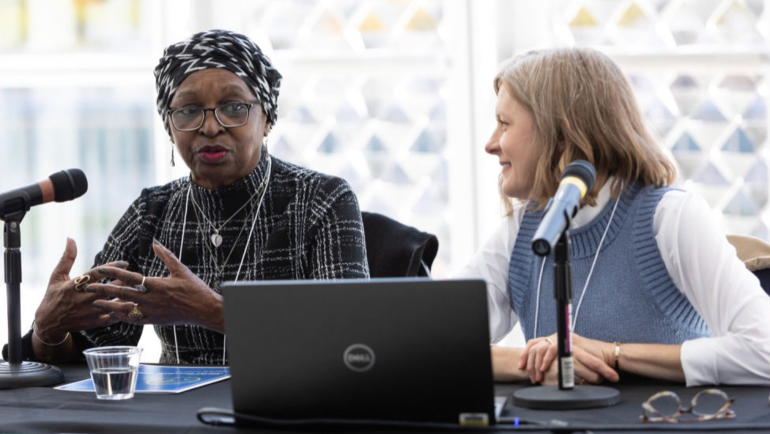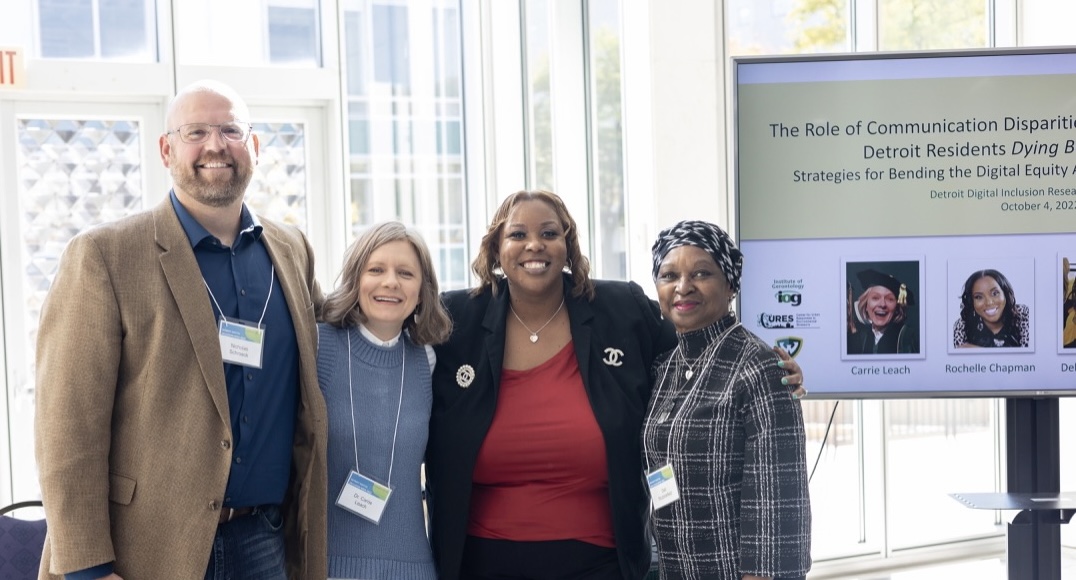Detroit’s digital exclusion worsens COVID-19 impact on older African Americans

DETROIT – Technological barriers, especially the inability to access telehealth and telemedicine, likely worsened health disparities in Detroit’s older African Americans during the COVID-19 pandemic. A recent article by Carrie Leach, Ph.D., M.P.A., a research assistant professor at the Institute of Gerontology at Wayne State University, and Nicholas Schroeck, J.D., of the University of Detroit Mercy School of Law, analyzed the health impact of Detroit’s low internet access.

and Dell Stubblefield (Community Advocate)
Older African Americans struggle with health disparities that put them at higher risk of hypertension, heart disease, cancer and other health problems. The increase in virtual care methods designed to protect vulnerable older adults from COVID-19 left many Detroiters without the information, services and resources to protect themselves and prevent harm.
“We explored how technology and connectivity problems adversely affected older Detroiters’ health during the pandemic, and what can be done to bridge this digital divide and decrease health disparity,” Schroeck said.
The article, “The Exacerbating Role of Technological and Connectivity Challenges on Older Detroiters’ Health in a Pandemic,” appeared in the May 2023 issue of the Seattle Journal of Technology, Environmental & Innovation Law. The authors looked at Detroit’s demographics, internet access and ways to bridge the digital gap. Detroit is a diverse, African American-majority city, and the second-most impoverished city in the nation, with one of the lowest rates of internet connectivity. Among residents fortunate to have internet access, digital literacy can remain low and impede their use of trusted and reliable health information. This “digital exclusion” contributes to older African Americans’ poorer health outcomes.
Detroiters age 65 and up are the fastest-growing segment of the city’s population, and more than one-third of them manage at least three chronic health conditions. “As stay-at-home orders were announced during COVID, digital health care options became essential,” Leach said. “But a legacy of racist, discriminatory policies in Detroit have impeded education and health and literacy. Combine that with poor access to the internet, and risks of poor health outcomes rise dramatically.”
Schroeck and Leach reported that few medical practitioners in Detroit could optimize the use of telehealth and telemedicine during the pandemic due to lack of patient access to the technology.
“The internet connection is only the first hurdle,” Leach said. “Video quality and reception for health treatments require high-speed connections, but the largest internet providers in Detroit have average speeds below the minimum required.”
Addressing the problem
In 2022, Michigan allocated $250 million to expand broadband access across the state, including upgrades and expansions to Detroit’s networks. To build on this work, Leach and Schroeck recommend disseminating health information to Detroiters through in-person social networking throughout the city.
The two authors co-lead the Community Engagement Core (CEC) of the Center for Urban Responses to Environmental Stressors (CURES), which educates and advocates for improved environmental health. Based on their experience, they understand the importance of working directly with residents to improve access to information so that it reaches people where they are. The CEC distributed 1,700 free computers to residents over the age of 65 during the pandemic, and then learned that many users lacked the digital knowledge to use them effectively. CURES responded by developing basic instruction materials to help.
“Many people are still practicing social distancing. We want to help older adults stay safe and well, even if they are physically distancing, and we know technology can help them remain socially close with people they care about and help them manage their health,” Leach said. As an example, she said that hospitals could provide patients with devices for virtual check-ins and monitoring when they are discharged, and churches and other organizations should consider hosting virtual worship services and meet-ups to engage members. “With better broadband, affordable devices and convenient training options, we can bridge the digital gap and improve the health of older Detroiters.”
The Institute of Gerontology does research on aging, trains students, and informs professionals, caregivers and older adults on aging issues (iog.wayne.edu). It is part of the Division of Research at Wayne State University.
Assets
Contact info
Julie O'Connor
Director, Research Communications
Phone: 313-577-8845
Email: julie.oconnor@wayne.edu